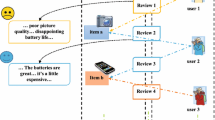Abstract
We discuss the problem in applying topic models to user reviews. Different from ordinary documents, reviews in a same category are similar to each other. This makes it difficult to estimate meaningful topics from these reviews. In this paper, we develop a new model for this problem using the distance dependent Chinese restaurant process. It need not decide the size of windows and can consider neighboring sentences adaptively. We compare this model to the Multi-grain latent Dirichlet allocation which has been proposed previously, and show that our model achieves better results in terms of perplexity.
Access this chapter
Tax calculation will be finalised at checkout
Purchases are for personal use only
Preview
Unable to display preview. Download preview PDF.
Similar content being viewed by others
References
Blei, D.M., Ng, A., Jordan, M.I.: Latent Dirichlet allocation. Journal of Machine Learning Research 3, 993–1022 (2003)
Titov, I., McDonald, R.: Modeling online reviews with multi-grain topic models. In: Proceedings of the 17th International World Wide Web Conference, pp. 112–120 (2008)
Blei, D.M., Frazier, P.: Distance dependent Chinese restaurant processes. Journal of Machine Learning Research 12, 2461–2488 (2011)
Griffiths, T.L., Steyvers, M.: Finding scientific topics. Proceedings of the National Academy of Sciences 101, 5228–5235 (2004)
Minka, T.P.: Estimating a Dirichlet distribution. Technical report, Microsoft (2000)
Ritter, T., Tanner, M.: Facilitating the Gbibs sampler: The Gbibs stopper and the Griddy-Gbibs sampler. Journal of the American Statistical Association 87, 861–868 (1992)
Author information
Authors and Affiliations
Editor information
Editors and Affiliations
Rights and permissions
Copyright information
© 2013 Springer-Verlag Berlin Heidelberg
About this paper
Cite this paper
Konishi, T., Kimura, F., Maeda, A. (2013). Topic Model for User Reviews with Adaptive Windows. In: Serdyukov, P., et al. Advances in Information Retrieval. ECIR 2013. Lecture Notes in Computer Science, vol 7814. Springer, Berlin, Heidelberg. https://doi.org/10.1007/978-3-642-36973-5_71
Download citation
DOI: https://doi.org/10.1007/978-3-642-36973-5_71
Publisher Name: Springer, Berlin, Heidelberg
Print ISBN: 978-3-642-36972-8
Online ISBN: 978-3-642-36973-5
eBook Packages: Computer ScienceComputer Science (R0)




